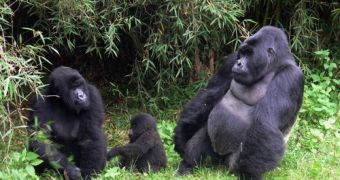Only yesterday, the World Wildlife Fund made it public news that, according to a recent census carried out by environmentalists working with the Uganda Wildlife Authority, the world's mountain gorilla population has increased by roughly 10%.
Before anyone jumps at the conclusion that this species is well on track of no longer being an endangered one, it must be said that this population “boom” merely means that, instead of 781 such great apes, the world now has 880.
In other words, the mountain gorillas still need quite a lot of help if they are not to become extinct in the not so distant future.
Still, the World Wildlife Fund wishes to emphasize the fact that this 10% increase in their population is proof enough that both conservation efforts and the local communities' involvement in helping out these great apes have done their job in upping the overall headcount for the species.
“Mountain gorillas are the only great ape experiencing a population increase. This is largely due to conservation efforts and successful community engagement,” explained David Greer, presently employed as manager for the World Wildlife Fund's African great ape program.
As this green-oriented group explains, conservation efforts also benefited from the fact that these great apes grew accustomed to having people around, which naturally made it possible for environmentalists to attract more tourists and use the incomes provided by them to help the species.
For the time being, the mountain gorillas and the people looking after their wellbeing still have to figure out how to cope with the fact that oil exploration activities might soon be carried out in the Virunga National Park, which is presently home to several such great apes.
“More people in Virunga would likely lead to an increase in deforestation, illegal hunting and more snares in the forest. At least seven Virunga mountain gorillas have been caught in snares this year and two did not survive,” David Greer said.
Furthermore, “The gorilla population remains fragile and could easily slip into decline if conservation management was to be disregarded in the pursuit of oil money by elites.”

 14 DAY TRIAL //
14 DAY TRIAL //